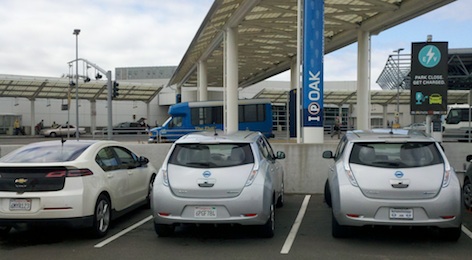A total of 3.2 million plug-in electric vehicles will be sold worldwide by 2015, with a compound annual growth rate (CAGR) of 106% is forecasted by Pike Research. Annual EV sales will cross the 1 million mark for the first time during the same year.
Pike Research forecasts that in the United States, the top cities for EV adoption between 2011 and 2017 will be New York, Los Angeles, San Francisco, San Diego, and Chicago. The electric utilities with the largest number of EVs in their service territories will be Southern California Edison, Pacific Gas & Electric, Consolidated Edison, Exelon, and FPL Group.
Pike Research’s Electric Vehicle Consumer Survey finds that 43% of U.S. consumers would be “extremely†or “very†interested in purchasing an electric vehicle. However, the firm’s price sensitivity analysis concludes that consumers’ willingness to pay a premium for EVs is significantly below manufacturers’ expected prices.
More than 4.7 million EV charge points will be installed globally by 2015. Among EV supply equipment (EVSE) vendors, the proprietary Pike Pulse analytical methodology finds that Coulomb Technologies is the market leader in terms of both strategy and execution, followed by ECOtality.
Cyber security for EV charging systems is a challenge that remains largely unmet by the industry. Pike Research finds that the prevailing philosophy of the EV industry has been “build first, secure later,†an approach that poses many risks for financial transactions, customer privacy, and the integrity and reliability of the grid infrastructure.
Similarly, a lack of technical standards could hinder utilities’ readiness for EVs, though the industry is beginning to make progress in this area. The firm forecasts that investment in electric vehicle IT systems will reach $1.5 billion worldwide by 2015.
Details are in the Pike Research Electric Vehicles Advisory Service, a subscription-based information suite that provides independent and objective market intelligence and strategy insights for companies and other organizations engaged in the rapidly evolving electric vehicle (EV) industry ecosystem. As part of the service, Pike Research’s global team of industry analysts cover key trends and growth scenarios for plug-in electric vehicles (PEVs) and their enabling technologies such as EV charging station infrastructure, EV information technology systems, and EV battery technologies.
“The electrification of vehicles represents one of the most profound changes to the automotive industry in the past 100 years, both for consumer and fleet markets,†says Pike Research president Clint Wheelock. “As EVs are adopted in larger numbers in the coming decade, this transformation will not only affect drivers themselves, but also utilities, municipalities, and corporations across multiple industries, to name just a few.â€
As part of its Electric Vehicles service, Pike Research’s industry analysts offer timely and actionable market insights, covering specific technology and business sectors as well as overall market conditions and trends. Research reports include an in-depth examination of business models, technology issues, policy and regulatory factors, the competitive landscape, and market sizing, segmentation and forecasting.


It would be good if Pike’s could assess the outcome of the growth of 4 significant technologies that will affect the rate at which electric cars will flourish. They may not be using the combination of the 4 to make their prediction.
1- The development of swappable batteries that are lighter and will also simplify extending the range of any vehicle.
2-The expansion of on line higher education. Though this could also be used in a magnified extreme at lower levels, it will be the enrichment of the higher levels that increase the productivity of engineers, and their pursuits. The increase and new discoveries in robotics as well as the use of solar will increase the numbers of finished products.
3-Solar ink (along with the presses that utilize it). This in turn will cause the mass installation of rooftop solar.
4-Modern construction techniques. The timelines for building new structures decreases constantly. Even though construction has not been pushed to higher levels, because of the state of the economy, construction methodology and technology has, and will continue to become smarter.
American providers will always have a larger profit attached to their products, this will slow, but not stop the advancement of the above. Pressure from other countries will force their hand. Pike’s has never before tried to make predictions with the growth of the above mentioned 3 technologies, because it has not existed prior to this point in time.
Their are likely several other factors, that will accelerate the timelines of the above. The key point, is that those in control of the existing systems and power will keep our country aiming low, with their predictions that include way too many years added. It appears that this is purposeful, so that they may maintain their grip on the existing monopolies and keep the American consumer at bay.